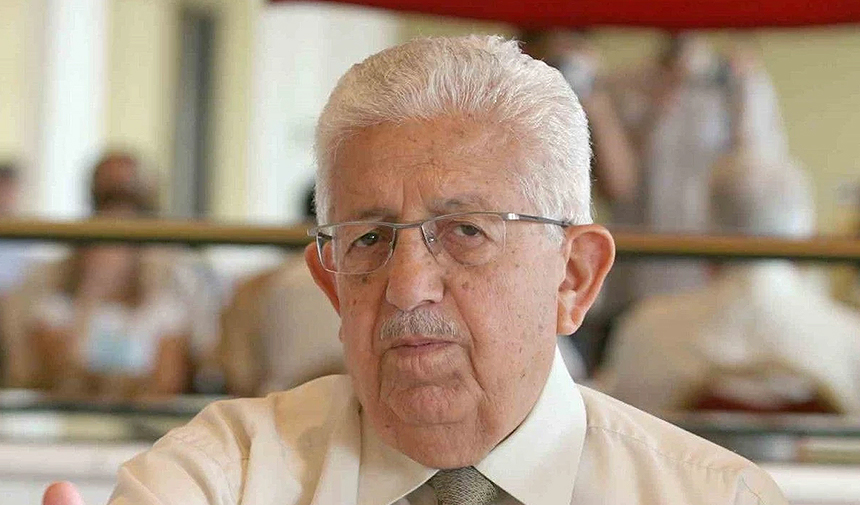Recai Kutan’s Death, Farewell to a Doyen of Turkish Politics
Recai Kutan, one of the most prominent figures in Turkish politics, Founding Chairman of the Felicity Party and one of Necmettin Erbakan’s closest colleagues, passed away at the age of 94. Kutan held important positions in Turkish politics for many years and was especially recognized as one of the prominent leaders of the National Vision movement. In addition to his political career, he was respected by all segments of society for his statesmanship and personality.
In a statement made on the official social media account of the Saadet Party, the news of Kutan’s death was announced with the following statements: “Our Founding Chairman of the Felicity Party, High Advisory Board Member, ESAM Chairman, our esteemed elder Recai Kutan has passed away. Our nation and our community are in deepest condolences.”
A Name Stamping Turkish Politics
Recai Kutan was born in Malatya in 1930. Kutan, who drew attention with his success and discipline especially in his educational life during his youth, completed his high school education in Malatya. At Malatya High School, he took literature lessons from the famous poet Arif Nihat Asya and was greatly influenced by his ideas. In 1947, after graduating from high school, he entered Istanbul Technical University (ITU) Faculty of Civil Engineering and graduated as a civil engineer in 1952.
During his university years, Kutan was active not only academically but also in social and cultural fields, such as wrestling, music and publishing. He also carried out important work in student unions. After his graduation, he started his professional life and in 1954 he married Mebrure Hanım. From this marriage, he had three children, İsmail, Abdülaziz Murat and Ahmet.
After completing his military service, Kutan continued his professional career and took part in important projects in the engineering and construction sector. However, he actively entered politics in the early 1980s and quickly became an important figure in Turkish politics.
His Political Career and Role in the National Vision Movement
Recai Kutan started his political career in the Welfare Party, which was founded on July 19, 1983. He served as the Deputy Chairman of the party and as Malatya MP in the Grand National Assembly of Turkey. He was especially known for his role in the National Vision movement. Between 1996 and 1997, he served as the Minister of Energy and Natural Resources in the 54th government led by Necmettin Erbakan.
During Recai Kutan’s ministry, important steps were taken regarding Turkey’s energy policies. Kutan also worked with Erbakan during the establishment of the D-8 (Developing Eight Countries), an international organization of developing Muslim countries.
After the Welfare Party was shut down by the Constitutional Court, he was elected as the chairman of the Virtue Party. However, when the Virtue Party was also dissolved in 2001, Recai Kutan became the founding chairman of the Felicity Party and was its leader for many years.
Recai Kutan, who adhered to the principles of the National Vision movement throughout his political life, was known as one of the most respected and experienced names in Turkish politics. In his political line, he attached great importance to moral values and national development. Kutan’s political understanding, personality and statesmanship aroused great respect in the entire political community.
Messages of Condolence after his passing
Many political leaders and institutions issued condolence messages upon Kutan’s death. Numan Kurtulmuş, the President of the Grand National Assembly of Turkey, made the following statements about Kutan’s passing: “We are deeply saddened by the loss of Recai Kutan, one of the doyens of the National Vision movement, a respected figure in Turkish politics with his morals, personality and statesmanship, who dedicated his life to the will of Allah and the development of Turkey. May God surround him with His mercy and may his place be in heaven.”
Condolence messages from different political segments of Turkey emphasized Kutan’s personality, political stance and commitment to his country. Many politicians emphasized Kutan’s contributions to Turkey’s development moves and his vision, especially in national energy policies.
Conclusion
Recai Kutan will continue to be remembered for the deep traces he left in Turkish politics and especially for his role in the National Vision movement. Kutan will be remembered as a respected figure in both his political and personal life. This valuable figure, who left his mark on Turkey’s recent political history, left behind many important projects, struggles and memories.



